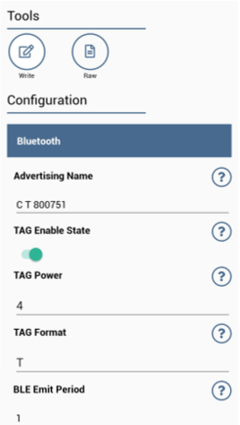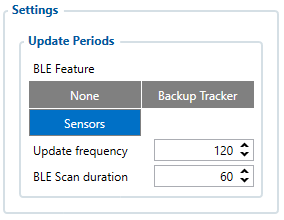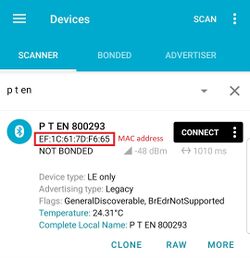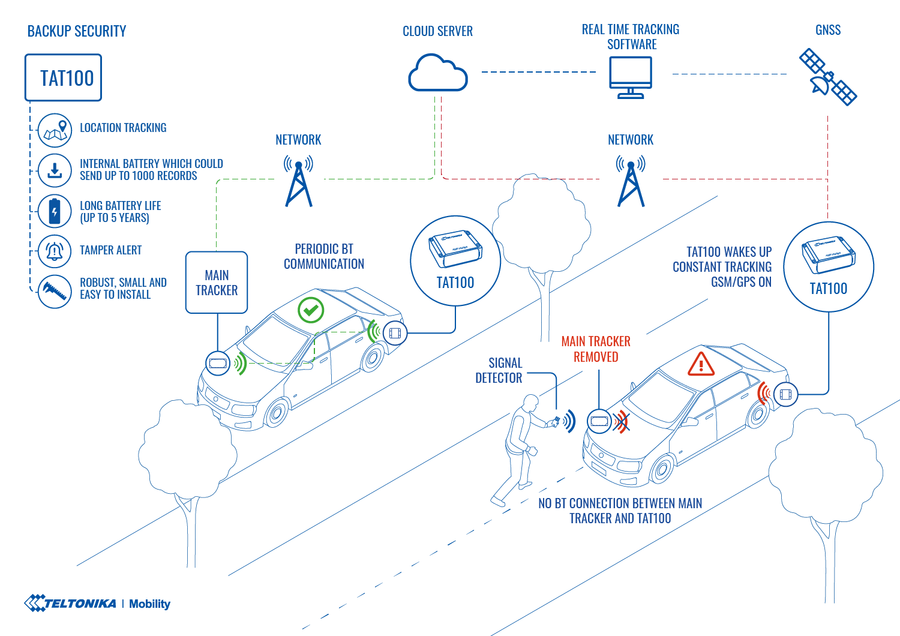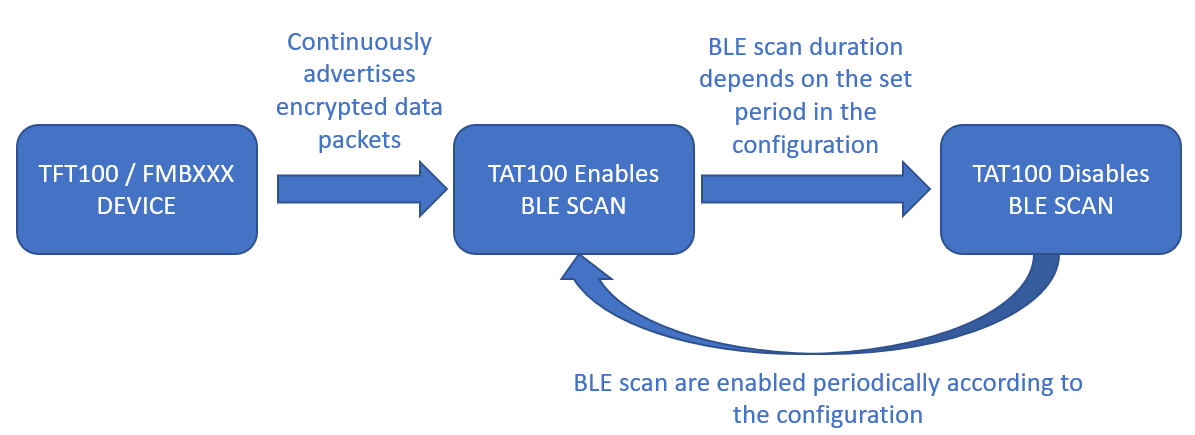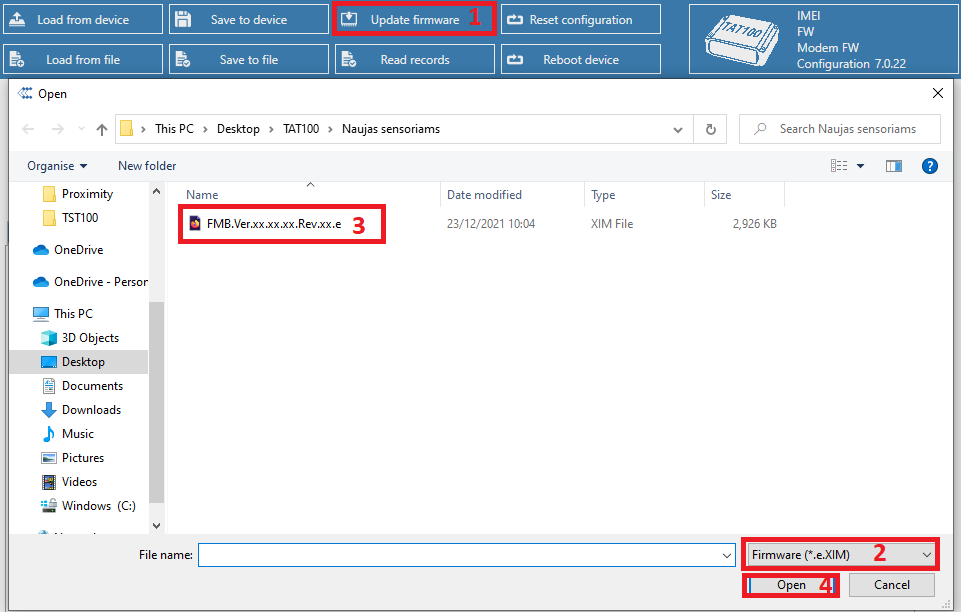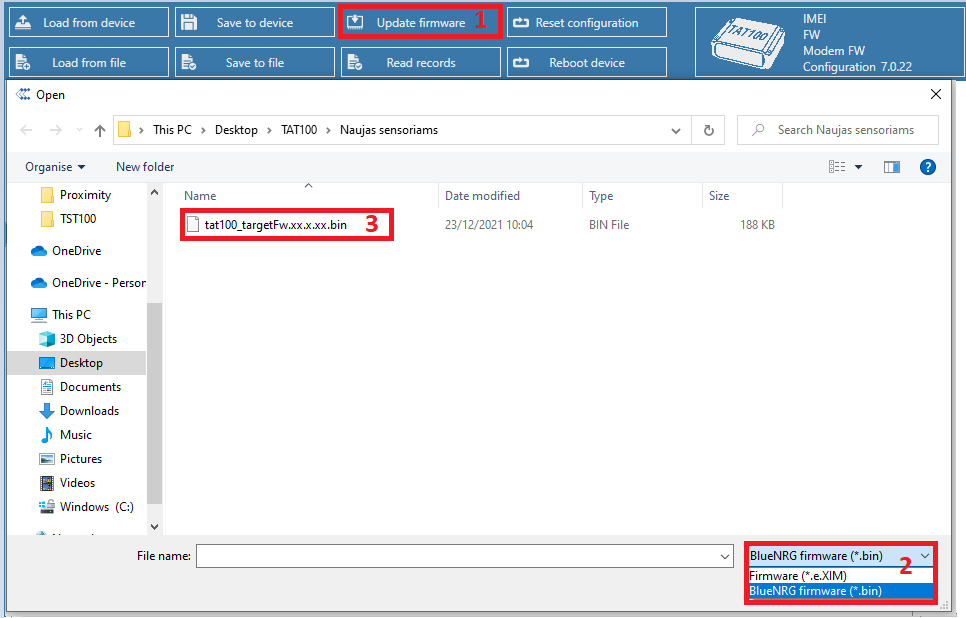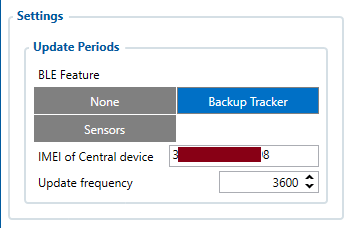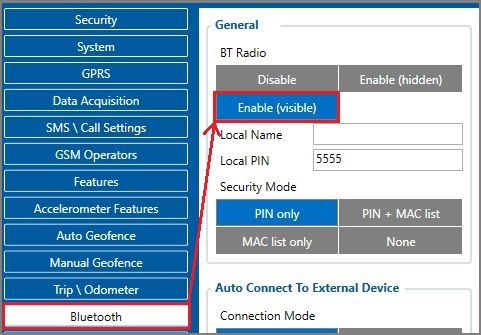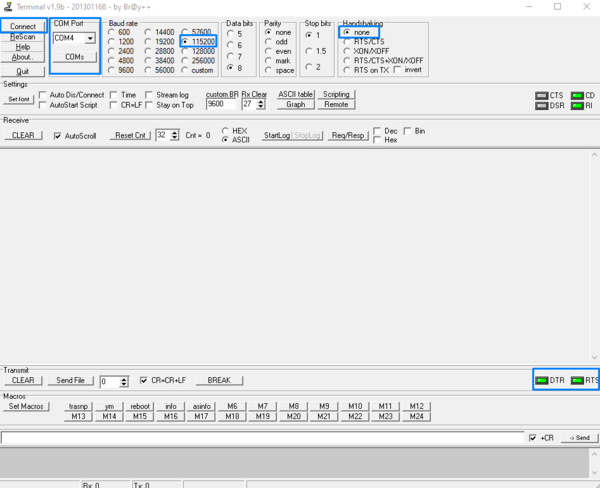Difference between revisions of "TAT140 Bluetooth settings"
m |
(Created page with "=Sensors= ==Configuring Blue Puck/Coin sensor== {| style="width: 100%;" |right|240px|border|class=tlt-border Bluetooth LE Blue Puck and Blue Coin...") |
||
| (7 intermediate revisions by 4 users not shown) | |||
| Line 1: | Line 1: | ||
| − | |||
| − | |||
| − | |||
| − | |||
| − | |||
| − | |||
=Sensors= | =Sensors= | ||
==Configuring Blue Puck/Coin sensor== | ==Configuring Blue Puck/Coin sensor== | ||
{| style="width: 100%;" | {| style="width: 100%;" | ||
|[[Image:ELA sensor app.PNG|right|240px|border|class=tlt-border]] | |[[Image:ELA sensor app.PNG|right|240px|border|class=tlt-border]] | ||
| − | + | Bluetooth LE Blue Puck and Blue Coin sensors are disabled by default. Configurations to these sensors are written through NFC.<br> | |
To do this download <b>[https://play.google.com/store/apps/details?id=com.ela.mobileapp.elamobileapp&hl=en_US| Device Manager Mobile]</b> by Ela from <i>Google Play Store</i> to your Android-powered device.<br> | To do this download <b>[https://play.google.com/store/apps/details?id=com.ela.mobileapp.elamobileapp&hl=en_US| Device Manager Mobile]</b> by Ela from <i>Google Play Store</i> to your Android-powered device.<br> | ||
<b>Note!</b> Android-powered device that is used for configuring Blue Puck/Coin sensors must support NFC read/write functionality.<br><br> | <b>Note!</b> Android-powered device that is used for configuring Blue Puck/Coin sensors must support NFC read/write functionality.<br><br> | ||
| − | Follow these instructions to easily configure Blue Puck/Coin | + | Follow these instructions to easily configure Blue Puck/Coin Bluetooth LE sensor: |
| − | *Enable <code> | + | *Enable <code>Bluetooth</code> and <code>NFC</code> on your Android-powered device. |
*Launch <b>Device Manager Mobile</b> on your Android-powered device. | *Launch <b>Device Manager Mobile</b> on your Android-powered device. | ||
*Select <i>Configuration.</i> | *Select <i>Configuration.</i> | ||
| Line 36: | Line 30: | ||
[[Image:TAT100_BLE_Sensor_configuration_v3.png|{{{general|size}}}|right]] | [[Image:TAT100_BLE_Sensor_configuration_v3.png|{{{general|size}}}|right]] | ||
'''BLE Feature:'''<br> | '''BLE Feature:'''<br> | ||
| − | <code>None</code> – | + | <code>None</code> – Bluetooth functionality will be disabled. <br> |
| − | <code>Sensors</code> – Enables | + | <code>Sensors</code> – Enables Bluetooth functionality for sensors. <br> |
'''Update frequency''' – how often BLE scanning will run. <br> | '''Update frequency''' – how often BLE scanning will run. <br> | ||
| Line 57: | Line 51: | ||
{|style="width: 100%;" | {|style="width: 100%;" | ||
| − | To check if the device has already received data from <b>Blue Puck/Coin</b> | + | To check if the device has already received data from <b>Blue Puck/Coin</b> Bluetooth LE sensor, follow these steps: |
:* Navigate to<code>Status</code> section. | :* Navigate to<code>Status</code> section. | ||
:* Press <code>I/O Info</code> and look if <span style=color:#F6A83E>BLE Temp</span> has any values (depends on the type of sensor being used). | :* Press <code>I/O Info</code> and look if <span style=color:#F6A83E>BLE Temp</span> has any values (depends on the type of sensor being used). | ||
| Line 65: | Line 59: | ||
{|style="width: 100%;" | {|style="width: 100%;" | ||
[[Image:TAT140_BLE_IO.png|center|1000px|border|class=tlt-border]] | [[Image:TAT140_BLE_IO.png|center|1000px|border|class=tlt-border]] | ||
| − | To check if the device has already received data from <b>Blue Puck/Coin</b> | + | To check if the device has already received data from <b>Blue Puck/Coin</b> Bluetooth LE sensor, follow these steps: |
:* Navigate to<code>I/O</code> section. | :* Navigate to<code>I/O</code> section. | ||
:* configure BLE Temp section #1 if you only have one sensor configured. | :* configure BLE Temp section #1 if you only have one sensor configured. | ||
| Line 92: | Line 86: | ||
===Blue Puck/Coin T=== | ===Blue Puck/Coin T=== | ||
| − | + | Bluetooth LE Temperature sensor configuration | |
<table style="border-collapse: collapse; width:100%;" border="1;"> | <table style="border-collapse: collapse; width:100%;" border="1;"> | ||
<tr style="text-align: center; background: #90c6ff;> | <tr style="text-align: center; background: #90c6ff;> | ||
| Line 130: | Line 124: | ||
<br> | <br> | ||
===Blue Puck/Coin RHT=== | ===Blue Puck/Coin RHT=== | ||
| − | + | Bluetooth LE Temperature and Humidity sensor configuration | |
<table style="border-collapse: collapse; width:100%;" border="1;"> | <table style="border-collapse: collapse; width:100%;" border="1;"> | ||
<tr style="text-align: center; background: #90c6ff;> | <tr style="text-align: center; background: #90c6ff;> | ||
| Line 191: | Line 185: | ||
===Blue Puck/Coin MAG=== | ===Blue Puck/Coin MAG=== | ||
| − | + | Bluetooth LE Magnet sensor configuration | |
<table style="border-collapse: collapse; width:100%;" border="1;"> | <table style="border-collapse: collapse; width:100%;" border="1;"> | ||
<tr style="text-align: center; background: #90c6ff;> | <tr style="text-align: center; background: #90c6ff;> | ||
| Line 230: | Line 224: | ||
===Blue Puck/Coin MOV=== | ===Blue Puck/Coin MOV=== | ||
| − | + | Bluetooth LE Movement sensor configuration | |
<table style="border-collapse: collapse; width:100%;" border="1;"> | <table style="border-collapse: collapse; width:100%;" border="1;"> | ||
<tr style="text-align: center; background: #90c6ff;> | <tr style="text-align: center; background: #90c6ff;> | ||
| Line 532: | Line 526: | ||
'''To ENABLE backup feature on TAT140 device:''' | '''To ENABLE backup feature on TAT140 device:''' | ||
| − | # <code> | + | # <code>Bluetooth</code> → select <code>Backup Tracker</code><br> |
# Enter main device (FMBxxx/TFT100/TST100/GH5200/TMT250) IMEI<br> | # Enter main device (FMBxxx/TFT100/TST100/GH5200/TMT250) IMEI<br> | ||
# Set <b>Update frequency</b> to <b>3600</b> (s) – <i>We do not recommend to set values below <b>1800</b> sec. in this field, as it will shorten the battery life.</i><br> | # Set <b>Update frequency</b> to <b>3600</b> (s) – <i>We do not recommend to set values below <b>1800</b> sec. in this field, as it will shorten the battery life.</i><br> | ||
| Line 538: | Line 532: | ||
| − | [[File: | + | [[File:TAT100_Bluetooth_Backup_v2.png|center|400px]] |
'''To ENABLE backup feature on FMBXXX/TFT100/TST100/GH5200/TMT250 devices:''' | '''To ENABLE backup feature on FMBXXX/TFT100/TST100/GH5200/TMT250 devices:''' | ||
| − | 1. <code> | + | 1. <code>Bluetooth</code> → <code>BT Radio</code> set to <code>Enable(visible)</code> |
[[File:BT ONN.jpg|center|500px]] | [[File:BT ONN.jpg|center|500px]] | ||
| − | 2. <code> | + | 2. <code>Bluetooth 4.0</code> → <code>Backup Tracker</code> set to <code>Enabled</code> |
[[File:TAT100_bluetooth_backup_enable.png|center|700px]] | [[File:TAT100_bluetooth_backup_enable.png|center|700px]] | ||
| Line 569: | Line 563: | ||
3. When TAT140 cannot see the main tracker Terminal will print a line as shown in example below:<br> | 3. When TAT140 cannot see the main tracker Terminal will print a line as shown in example below:<br> | ||
<code>[2021.10.26 10:50:03] – [ASSET.UART] << [2021.10.26 10:50:03] – [APP.TBT] ERROR! Amount of valid packets does not detect during this period! Triggering alarm </code><br> | <code>[2021.10.26 10:50:03] – [ASSET.UART] << [2021.10.26 10:50:03] – [APP.TBT] ERROR! Amount of valid packets does not detect during this period! Triggering alarm </code><br> | ||
| + | |||
| + | [[Category:TAT140 Configuration]] | ||
Revision as of 10:46, 7 April 2023
Pages with broken file links > TAT140 Bluetooth settingsSensors
Configuring Blue Puck/Coin sensor
|
Bluetooth LE Blue Puck and Blue Coin sensors are disabled by default. Configurations to these sensors are written through NFC. Follow these instructions to easily configure Blue Puck/Coin Bluetooth LE sensor:
Once the configuration is written successfully, the Blue Puck/Coin sensor will be enabled and use the settings configured in the APP.
|
Update Periods
BLE Feature:
None – Bluetooth functionality will be disabled.
Sensors – Enables Bluetooth functionality for sensors.
Update frequency – how often BLE scanning will run.
Scan duration – how long scanning will be processed.
- Type your Blue Puck/Coin MAC address in
MACfield. You can check what is yourMACaddress by using nRF connect for Mobile app from Google Play. - Configure the sensor fields according to the type of sensor used. More information about these settings can be found on Blue Puck/Coin presets section.
- After all these steps press
Save to deviceto save configuration.
- Type your Blue Puck/Coin MAC address in
To check if the device has already received data from Blue Puck/Coin Bluetooth LE sensor, follow these steps:
- Navigate to
Statussection. - Press
I/O Infoand look if BLE Temp has any values (depends on the type of sensor being used).
- Navigate to
To check if the device has already received data from Blue Puck/Coin Bluetooth LE sensor, follow these steps:
- Navigate to
I/Osection. - configure BLE Temp section #1 if you only have one sensor configured.
- Set sensor priority High to immediately send a record.
- Select Temperature range (Low – High)
- Select Operand:
On Entrance– when temperature enters specified range, the device sends a record to the server.On Exit– when temperature exits specified range, the device sends record to the server.On Both– Sends a record when device enters or exits specified range.Monitoring– Performs the BLE scan when the device wakes up for periodic tracking action and sends the data to the server with the periodic record.
- Navigate to
Record received to the Server
- Device sent a record when it entered the range between 24 – 24.5 C
Blue Puck/Coin and EYE presets
To read data from Blue Puck/Coin and EYE sensors, Sensor table must be configured with specified parameters to a particular sensor.Using premade sensor presets
The configurator includes premade presets for sensors such as Blue PUCK/COIN MOV, MAG, T, RHT and etc.
Blue Puck/Coin T
Bluetooth LE Temperature sensor configuration
| Type | Data Offset | Data Size | Action | IO | Match | Endianess | Multiplier | Offset |
|---|---|---|---|---|---|---|---|---|
| FE | 5 | 2 | Match | None | 6E2A | Little Endian | 1 | 0 |
| FE | 7 | 2 | Save | Temperature | Big Endian | 0.1 | 0 |
Blue Puck/Coin RHT
Bluetooth LE Temperature and Humidity sensor configuration
| Type | Data Offset | Data Size | Action | IO | Match | Endianess | Multiplier | Offset |
|---|---|---|---|---|---|---|---|---|
| FE | 5 | 2 | Match | None | 6E2A | Little Endian | 1 | 0 |
| FE | 7 | 2 | Save | Temperature | Big Endian | 1 | 0 | |
| FE | 11 | 2 | Match | None | 6F2A | Little Endian | 1 | 0 |
| FE | 13 | 1 | Save | Humidity | Little Endian | 1 | 0 |
Blue Puck/Coin MAG
Bluetooth LE Magnet sensor configuration
| Type | Data Offset | Data Size | Action | IO | Match | Endianess | Multiplier | Offset |
|---|---|---|---|---|---|---|---|---|
| FE | 5 | 2 | Match | None | 062A | Little Endian | 1 | 0 |
| FE | 7 | 2 | Save | Custom | Little Endian | 1 | 0 |
Blue Puck/Coin MOV
Bluetooth LE Movement sensor configuration
| Type | Data Offset | Data Size | Action | IO | Match | Endianess | Multiplier | Offset |
|---|---|---|---|---|---|---|---|---|
| FE | 5 | 2 | Match | None | 062A | Little Endian | 1 | 0 |
| FE | 7 | 2 | Save | Custom | Little Endian | 1 | 0 |
EYE SENSOR (Sensors)
EYE sensor (Sensors mode) configuration
| Type | Data Offset | Data Size | Action | IO | Match | Endianess | Multiplier | Offset |
|---|---|---|---|---|---|---|---|---|
| FE | 21 | 2 | Save | Temperature | Little Endian | 0.1 | 0 | |
| FE | 23 | 1 | Save | Humidity | Little Endian | 10 | 0 | |
| FE | 24 | 2 | Save | Custom1 | Big Endian | 1 | 0 | |
| FE | 29 | 1 | Save | Battery | Little Endian | 1 | 0 |
EYE SENSOR (iBeacon & Sensors)
EYE sensor (iBeacon & Sensors mode) configuration
| Type | Data Offset | Data Size | Action | IO | Match | Endianess | Multiplier | Offset |
|---|---|---|---|---|---|---|---|---|
| 09 | 19 | 2 | Save | Custom1 | Big Endian | 1 | 0 | |
| 09 | 16 | 2 | Save | Temperature | Little Endian | 0.1 | 0 | |
| 09 | 18 | 1 | Save | Humidity | Little Endian | 10 | 0 | |
| 09 | 24 | 1 | Save | Battery | Little Endian | 1 | 0 |
EYE SENSOR (Eddystone & EYE Sensors)
EYE sensor (Eddystone & EYE sensors mode) configuration
| Type | Data Offset | Data Size | Action | IO | Match | Endianess | Multiplier | Offset |
|---|---|---|---|---|---|---|---|---|
| FF | 7 | 2 | Save | Custom1 | Big Endian | 1 | 0 | |
| FF | 4 | 2 | Save | Temperature | Little Endian | 0.1 | 0 | |
| FF | 6 | 1 | Save | Humidity | Little Endian | 10 | 0 | |
| FF | 12 | 1 | Save | Battery | Little Endian | 1 | 0 |
Backup Tracker
Introduction to Backup Tracker functionality
TAT140 supports a feature which allows to work as backup tracker.
1. Even if Backup tracker is in alarm mode, device will continue to track its position as configured.
2. If FMBXXX device (Compatibility table) is turned off, Alarm event from the TAT140 will be received and AVL 236 in the data packet will be sent.
Topology scheme
Backup feature logic
| NOTE: | If TAT140 does not pick up advertised data packets from main tracker, TAT140 enters alarm state, generates and starts sending records with AVL ID 236 (Value 0). |
| Parameter Name | Description | ID | Value |
|---|---|---|---|
| BLE Feature | Select which BLE feature is enabled. For Backup Tracker "Backup Tracker" feature has to be selected |
189 | 0 - None 1 - Backup Tracker 2 -Sensors |
| Central Device IMEI | IMEI of central device that TAT140 is connected | 190 | Valid IMEI number |
| Update Frequency | Time in seconds for scanning intervals | 1100 | Min 5 sec. Max 66535 sec. Default 120 sec. |
| Scan Duration | Time in seconds for how long BLE scan will be running | 1113 | Up to 60 seconds (Not configurable) |
FIRMWARE (MODEM AND BLUENRG) INSTALLATION
Download Firmware and Configurator from STABLE FIRMWARE or SHORT-TERM FIRMWARE pages.
After device connection to Configurator:
1) Select Update firmware;
2) Select to flash Firmware(*.e.XIM) file;
3) Click on file;
4) And select Open.
Wait until the device will upload the firmware.
When parameters successfully loaded:
1) Select Update firmware;
2) Select to flash BlueNRG firmware(*.bin);
3) Click on file;
4) And select Open.
Instructions
To ENABLE backup feature on TAT140 device:
Bluetooth→ selectBackup Tracker- Enter main device (FMBxxx/TFT100/TST100/GH5200/TMT250) IMEI
- Set Update frequency to 3600 (s) – We do not recommend to set values below 1800 sec. in this field, as it will shorten the battery life.
- Configure your APN and Server settings in GPRS section.
To ENABLE backup feature on FMBXXX/TFT100/TST100/GH5200/TMT250 devices:
1. Bluetooth → BT Radio set to Enable(visible)
2. Bluetooth 4.0 → Backup Tracker set to Enabled
DEVICE RECOGNITION CHECK USING TERMINAL
- Debug mode:
Device is able to transmit its current state when connected to PC using USB cable. It is used to detect errors and provide information to possible solutions when operating as unexpected.
- After launching terminal choose baud rate 115200 and hardware control – none.
- Select COM port which is assigned to “Virtual COM Port”.
- Click on ‘Start Log’ button and save a new file.
- Then click ‘Connect’ to start receiving messages from device.
Required Terminal application for log capturing can be downloaded here: Terminal
TAT140 terminal instructions:
1. Connect TAT140 to the computer and open it with Terminal as shown in example above.
2. When TAT140 recognizes the main tracker, a terminal will print a line as shown in example below:
[2021.10.26 06:28:40] – [ASSET.UART] << Device MAC: 785ae3d1f9de IMEI 141fa7497ac1 Command 0 Sequence 24 Packet Cnt 5
3. When TAT140 cannot see the main tracker Terminal will print a line as shown in example below:
[2021.10.26 10:50:03] – [ASSET.UART] << [2021.10.26 10:50:03] – [APP.TBT] ERROR! Amount of valid packets does not detect during this period! Triggering alarm
